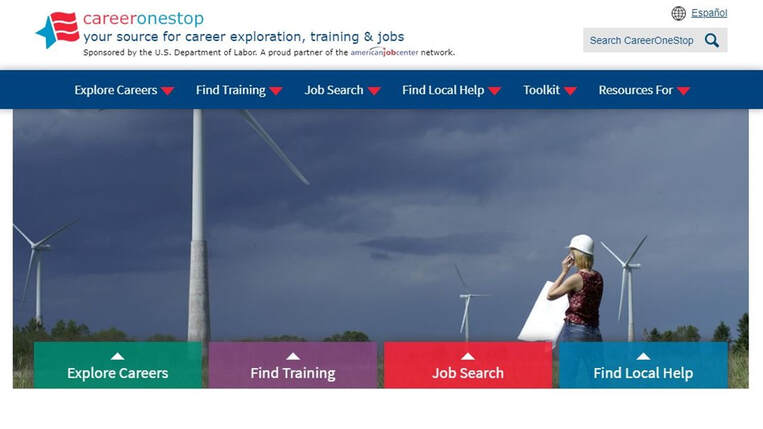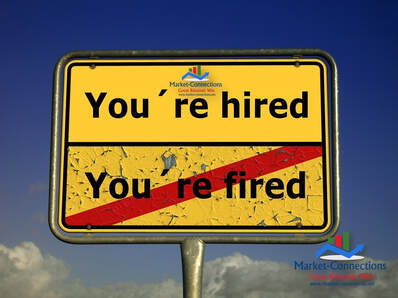Laid off, let go, or fired... Now what? Losing a job, layoffs, and discharges Losing a job, layoffs, and discharges Fired. Laid off. Let go. Downsized. Right-sized. These are all euphemisms for unemployment. No matter what you call it, it means you’re out of a job. Whether you think you might be in danger of losing your job, or you’ve already gotten the axe, this guide will help you make the successful transition to your next job. What’s important to remember is that you can be great at your job and still lose it. The economy, changes in the industry, mergers and acquisitions — all of these can affect your job. Even if you were fired because of something you did (or didn’t do), this moment doesn’t have to define your career. “The number of job openings fell to 7.1 million on the last business day of February, the U.S. Bureau of Labor Statistics reported on April 9, 2019. Over the month, hires and separations were little changed at 5.7 million and 5.6 million, respectively. Within separations, the quits rate was unchanged at 2.3 percent and the layoffs and discharges rate was little changed at 1.2 percent.” It defines “separations” as employees “separated from the payroll” during a specified period. This includes employees who left voluntarily (quit) as well as layoffs and discharges, retirements, transfers, deaths, or separations due to employee disability. With workers changing jobs an average of every five years (according to the BLS), it’s not unusual for some of those changes to come from layoffs or being fired. I’m Worried About My JobSometimes, there are signals when the loss of your job is imminent. Some of these are strong signals — your company is bought or merged into another company. (Another red flag is if there is a lot of duplication in job titles or functions within both companies. In this case, generally, the acquiring company’s employees will be the ones to stay.) Or your company loses a major client or the industry as a whole faces a crisis. An economic downturn may make you wonder if your job is safe. And don’t ignore the company grapevine. Anytime you hear rumors of layoffs, there is often a grain of truth to the tale. Or maybe you’re having a clash of personalities with your boss. On a related note, anytime you get a new boss, beware. Other times, you may not have an inkling that there is trouble in the company. The writing may not be on the wall, and you may be fired “out of the blue.” In hindsight, you realize you had started to be left out of key decisions or meetings. Or some of your workload had been shifted to other employees. But the changes were subtle. You can see them now, but you didn’t see them at the time. If you’re worried about losing your job, but you haven’t yet been fired, here are some things you should do to prepare:
Market-Connections' resume samples
You may also want to start searching for a new job. It’s almost always easier to find a job when you have a job, so if you think your job really is in jeopardy, you might want to start looking for your next job now.
What to ask for:
In most cases, you’ll be asked to leave the building immediately, and will be escorted off the premises (especially in mid-size or larger companies). You may not get a chance to pack up your personal belongings yourself, or even say good-bye to your colleagues. While it may feel unfair, it’s a safety concern for the company. Some fired employees have taken revenge on the company by destroying files or making a big scene, and that makes employers wary of letting you pack up your own belongings. If you are missing items or need access to information after you’re let go, contact the HR Department and/or your Supervisor for resolution. It can be difficult to do, but try to leave on good terms. You may end-up back at that company again at some point, or working with the same people in a future job. Plus, your future employer may contact the company for a Reference and/or you may want a Recommendation from your most recent Supervisor. First things firstThe shock of losing your job can be overwhelming. However, the decisions you make during this time are crucial to making a successful transition to a new position. One of the first things to do after being fired is to check into unemployment insurance benefits. If you are fired from a job, you are generally eligible for unemployment compensation unless your employer proves you left your job voluntarily (you quit or resigned), or you were discharged for misconduct. (And there is an appeals process even if your employer initially makes this claim.) The unemployment insurance system (UI) is a partnership of the federal government and state programs. Created in 1935, contributions are paid into the system on behalf of workers so they have an income if they lose their jobs. The basic UI program is managed by the states, although the U.S. Department of Labor oversees the system. States provide most of the funding and administer the benefit payments. Although states must follow federal requirements, they generally establish their own eligibility criteria and benefit levels. As of January 2013, regular unemployment insurance benefits — in most states — run for 26 weeks (plus one unpaid “waiting week”). For people who have not yet found a job within that time frame, Emergency Unemployment Compensation (EUC) and Extended Benefits (EB) offer additional compensation. Each of these programs has a different deadline. Consequently, the number of weeks you are eligible for will depend on when you filed your original claim. The permanent Extended Benefits (EB) program typically provides an additional 13 or 20 weeks of compensation to the unemployed who have exhausted their regular benefits in states where the unemployment situation has worsened dramatically. Your unemployment payment depends on your weekly earnings prior to being laid off, and the maximum amount of unemployment benefits available (this will vary by state). Unemployment benefits typically replace about half of your previous earnings, subject to a maximum benefit level. (Some states offer higher benefits to jobseekers with dependents.) Because the benefit is subject to a cap, unemployment insurance benefits replace a smaller share of previous earnings for higher-wage workers than for lower-wage workers. The unemployment insurance program provides benefits to people who:
Check and see if your state offers an unemployment insurance calculator. (A simple Google search can identify if one is available.) There are two types of unemployment calculators — one that tells you how much money you are entitled to collect, and another which tells you how many weeks you are eligible to collect unemployment. You may be eligible for unemployment benefits if:
You may not be eligible for benefits if:
File your claim for unemployment benefits as soon as possible. If you wait, you may lose out on benefits. You must meet eligibility requirements, but you can determine these from your state’s unemployment office. You may even be eligible for benefits (even partial benefits) if you work part-time. You may also be eligible to collect unemployment benefits while you are collecting severance or other benefits from your current position. Getting paid for unused vacation time you accrued normally does not affect your eligibility. However, you will not be eligible for benefits if you continue to receive your full salary and benefits your employer paid while you were employed. One thing you may not have realized is that unemployment benefits count as taxable income on your federal tax return. Unemployment compensation may or may not be taxable in your state. Check with the Department of Labor in your state for information. Make sure you set aside part of the money for taxes if taxes are not withheld from your payment. (In many states, you must request that taxes be withheld from your payment.) You may have to make quarterly estimated tax payments if you do not have taxes withheld from your unemployment benefit payments. Check with your tax advisor for advice. Getting fired may also open a new door to self-employment. But if unemployment benefits require jobseekers to continue looking for traditional work full-time, someone pursuing self-employment may lose their unemployment benefits, because they are not “actively seeking work.” In 2012, the Middle Class Tax Relief and Job Creation Act authorized $35 million in funds to encourage states to enhance and promote Self-Employment Assistance (SEA) programs. SEA entitles unemployed individuals to claim jobless benefits while simultaneously gaining access to small business development assistance. An individual with a “viable” business plan can continue to receive unemployment benefits as long as they are working full-time to get a new company off the ground. Under this program, individuals receive financial aid equal to their unemployment insurance benefits for a maximum of 26 weeks while they receive entrepreneurial training and other resources (including counseling and technical assistance) to help them launch a business. However, note that you are not eligible to receive extended unemployment benefits if you participate in the SEA program — you are limited to 26 weeks of payments. Check with your state’s Department of Labor to see if they offer a SEA program. There are also retraining and job support services available through the federal government. The national system of local One-Stop Career Centers (established by the Workforce Investment Act of 1998) offers job search assistance, career counseling, job search workshops, labor market information, and other employment services. You may access many of these services for free. Some programs provide funds for transitional training to individuals unable to obtain or retain employment. Some of these services are authorized through the Trade Adjustment Assistance (TAA) program to assist employees who lost their job due to international competition — for example, if their company shifted production or services offshore. TAA-eligible workers may also receive job retraining. The total period of unemployment benefits for a TAA-certified individual may last as long as 130 weeks. The Workforce Investment Act of 1998 also authorized programs for job training and vocational rehabilitation. These programs are administered by each state, so check with your state’s Department of Labor office for eligibility and access. In some states, you may receive one-on-one job counseling services (“intensive services”), including career testing, development of an individual employment plan, and group or individual counseling and career planning. These services can be accessed in addition to your work with a professional résumé writer. You may also be eligible to receive occupational skills training, private sector training programs, entrepreneurial training, adult education programs, and customized training, although some programs are only available to low-income individuals. Take advantage of the programs available to you. Many of these are paid for through state and federal funds. This isn’t charity. These are programs paid by tax dollars, and the goal is to get you back working again. What If I’m Part of a “Mass Layoff”You may receive advance notice of your job loss if you are part of a “mass layoff” event, defined as layoffs that involve at least 50 employees from a single company within a five-week period. In April 2013, there were 1,199 mass layoff actions that affected 116,849 workers, according to the Bureau of Labor Statistics. The Worker Adjustment and Retraining Notification (WARN) Act applies to employers with 100 or more employees. WARN requires employers to provide 60 days’ notice in advance of plant closings and/or mass layoffs (unless the layoff resulted from the closure of a faltering company, unforeseeable business circumstances, or a natural disaster). This provides some time to adjust to the prospective loss of employment. Employees entitled to notice under the WARN Act include managers and supervisors as well as hourly and salaried workers. If you’re part of a mass layoff, consider working with other employees at the company to find new jobs. Start a job search support group, or arrange a lunch-and-learn speaker series to bring in specialists from your state’s Department of Labor to provide information about state-offered services, unemployment compensation, and training opportunities. Should You Sue?You may feel that you were wrongfully terminated from your job. And you may be correct. You can’t be fired for being a whistle-blower (filing a compliant about a company’s illegal activities), or for not being willing to commit an illegal act for an employer. You can’t be fired for discriminatory actions — for example, because of your race, nationality, religion, gender, or age. However, if you are an employee in an “at-will employment” state, you can be fired without the company having to provide a reason. (Except you cannot be fired for unlawful discrimination, such as if you’re pregnant.) Some experts estimate that 250,000 workers are illegally or unjustly fired each year. If you successfully sue your previous employer, you may be able to recover lost wages or other damages. You may even get your old job back. But litigation can be costly, and even if you win your old job back, it may be an uncomfortable situation to come to work each day. State-specific laws apply, so consult an employment attorney in your city or state for specific guidance. Many offer brief “no charge” consultations. Get Your Finances In OrderOne of the biggest mistakes many people make after losing their job is not making immediate adjustments in their finances. With the average (mean) unemployment lasting 22+ weeks (BLS data, as of May 2019), and many workers living paycheck-to-paycheck, the first thing you should do is adjust your lifestyle to fit your new financial reality … at least temporarily. Make a list of your current expenses (review your checkbook register, credit card statements, or online banking profile) and see what you can cut out. Determine which of your current monthly expenses must be maintained (mortgage and car payments, utilities, groceries) and which ones you can do without for now. The sooner you make these adjustments, the better off you will be. Once you know what you’ll have to live on (unemployment benefits and savings, for example), you can determine if you need to find other sources of income — for example, a part-time job. (But be aware of the impact this will have on your unemployment benefits.) If your unemployment stretches on for a while, you may need to cut back to only making the minimum payments on your credit card bills, and suspend contributions to your individual retirement account. You may want to consider selling your car or your house to reduce your expenses. Look around your house and see if there is anything you can sell. Consider holding a garage sale. Try to avoid tapping into your retirement accounts, because you will incur a substantial tax penalty. If you have a cash-value life insurance policy, however, you may find that to be a source of emergency cash. (But you will have to pay interest on any loans you take out, and you’ll want to pay the loan back when you are able to.) When you are fired, you may experience a substantial loss in income. As a result, you may qualify for federal programs that determine eligibility based on income. For example, the Earned Income Tax Credit (EITC), Temporary Assistance for Needy Families, or Medicaid. You may also be eligible for special programs for the unemployed. For example, there are programs that may reduce your mortgage payments for a period of time. Your credit card company may reduce your interest rate or lower your required minimum payment due to a job loss. (If you have involuntary unemployment credit card insurance, your credit card company may cover the minimum payment if you are laid off for a specific period of time. However, charges incurred after the layoff are excluded, and if you’re fired for cause, you may not be eligible to make a claim for payment.) Don’t wait to explore your eligibility for these programs. Don’t WaitAlso, do not wait to begin your job search. The longer you are unemployed, the harder it is to find a new job. Some jobseekers feel they need a “break” before starting the job search. However, taking a vacation is the last thing you should be doing. If you lose your job unexpectedly (with little or no warning), it can be particularly difficult to move forward quickly with a new job search. You may still be mourning the loss of your old job. It’s a cliché, but the old adage of a window opening when a door closes applies here. If you are completely honest with yourself, can you think of one or more positive things that may result from this? Are there things you want to do in your next job that weren’t available to you in your previous position? Is there something you’ve always wanted to pursue, but didn’t because you were comfortable in your old job? Without a job to go to every day, your days may seem endless. It can be tempting to start working on some of those projects (either personal, or things around the house) that you’ve put off because you’ve been so busy with work. Don’t. You need to get started on your job search right away. It’s easier to find a job when you have a job. Hiring managers instinctively wonder why you were let go, so if you can answer that question for them up front, it may help you land the interview. The longer you are out of work, the bigger this issue becomes. So, don’t wait to start looking. Even if you think you’re not ready to go back to work again, there are many things you can do in the early stages of the job search to move yourself forward before you are ready to actually start applying for jobs. These may include:
Putting your résumé together can also provide a boost to your self-esteem as you work to gather your accomplishments. One of the most important questions you can prepare for is, “Why did you leave your last job?” Your answer to this question can mean the difference between being offered your next job, or not. Don’t be defensive in your answer. Don’t badmouth your previous employer. Both of these are huge turnoffs for an interviewer. It can be difficult not to carry the hurt and disappointment of being fired into your search for a new job, but negativity won’t get you far. And make sure the reason you give for leaving agrees with what your previous employer will say in a reference check. (If you didn’t clarify this during the termination meeting, now is the time to follow up with your previous supervisor or the company’s human resources department and find out.) The “Upside” of Being FiredWhile it may be difficult to find the silver lining in being fired, there can be some positives. One of the best things about searching for a new job while you’re unemployed is you can be open about your search. You don’t have to worry about your current employer finding out that you’re looking for a new job — which is one of the biggest risks of job searching while you’re working. You may also find that you receive more assistance, advice, and guidance from others in your job search if you were laid off than if you were conducting a job search while you are employed. Being let go might also be the push that you needed to make a change. It’s easy to become complacent in your career. When reflecting on this time in their life at a point in the future, many jobseekers say they wish they hadn’t had to go through it, but they ended up in a better job as a result. That may be difficult to see now, but keep that in mind as you move forward. This might be the motivation you needed to make significant changes in your life that were easy to put off when you had a job. Tips for SuccessEnlist the help of others. Form a support group of like-minded people who are ready to tackle the next opportunity. Share leads, contacts, and advice with each other. Celebrate your successes when job offers are received.
Get help and support. The older you are, the more fearful you may be. It can be beneficial to seek counseling or career coaching to help you during this time. Don’t be afraid to consult specialists to help you navigate the process — for example, an employment attorney if you feel you’re not being treated fairly by your previous employer. Stay positive. This is probably the most difficult thing to do after being fired, but it’s also the most important factor affecting your future success. It’s normal to feel sad, depressed, angry, or hurt when you’ve lost your job. Acknowledge your loss, but move forward one step at a time. Be sure to take care of yourself — eat right, exercise, don’t hole up at home. Take advantage of the programs and services available to you, and position yourself to be successful in your next job. |
Categories
All
powered by Surfing Waves
AuthorMandy Fard is a Certified Professional Resume Writer (CPRW, CMRW) and Recruiter with decades of experience in assisting job seekers, working directly with employers in multiple industries, and writing proven-effective resumes. Archives
July 2024
|
-
Greater Los Angeles
and Kern County
-
[email protected]
.










 RSS Feed
RSS Feed



